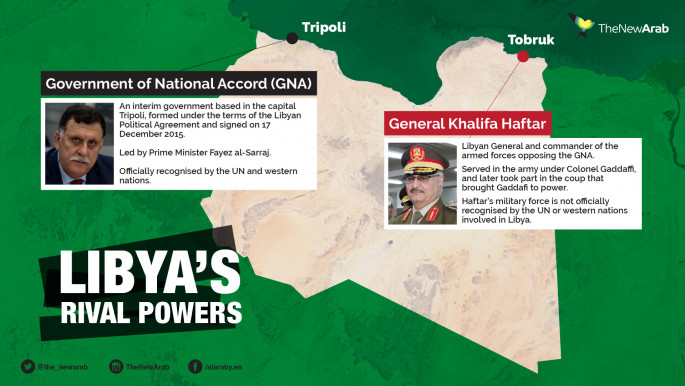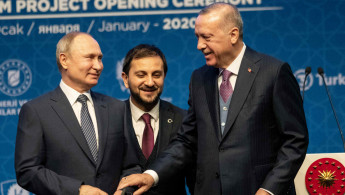Erdogan and Putin call for Libya ceasefire from Sunday
Turkish President Recep Tayyip Erdogan and Russian counterpart Vladimir Putin called on Wednesday for a ceasefire in Libya after talks in Istanbul, where they also inaugurated an "historic" gas pipeline.
The leaders used a joint statement to call for a truce from midnight on Sunday "supported by the necessary measures to be taken for stabilising the situation on the ground" in Libya, where they are seen as supporting opposing sides.
"Seeking a military solution to the ongoing conflict in Libya only causes further suffering and deepens the divisions among Libyans," President Erdogan and President Putin said in a joint statement.
"Securing an immediate cease-fire is the foremost priority to start an inclusive intra-Libyan political process under the UN auspices."
Turkey supports the embattled UN-recognised government in Tripoli, while Russia has backed the rival eastern-based forces of General Khalifa Haftar.
Last week, Turkey sent its first troops to help defend the UN-backed Tripoli government and Erdogan has accused 2,500 Russian mercenaries of supporting renegade strongman Khalifa Haftar - claims denied by Moscow.
The two parties will now await the response of other countries interested in the outcome of the Libyan war - namely Egypt, the United Arab Emirates and France.
Meanwhile, Tunisia refused a Turkish request to allow the Turkish army to conduct landings across the Tunisian-Libyan border, Al Arabiya reported.
A spokesperson for the Tunisian presidency told Radio Mosaique that Tunisia categorically rejects any foreign interference in Libya.

Since a 2011 NATO-backed uprising that killed longstanding dictator Muammar Gaddaffi, Libya has been plunged into chaos.
Tensions escalated last year when eastern-based General Khalifa Haftar and his self-styled Libyan National Army (LNA) launched an offensive to capture the capital Tripoli from the Government of National Accord (GNA).
Egypt, the United Arab Emirates and Russia back Haftar, while the GNA is supported by Turkey and Qatar.
TurkStream pipeline
Before their announcement on Libya, Erdogan and Putin inaugurated the TurkStream pipelines, which will deliver Russian gas to Turkey and Europe via the Black Sea.
Erdogan described it as a "project of historic importance", while Putin noted the strengthening "partnership of Russia and Turkey in all domains".
TurkStream and the Nord Stream pipelines under the Baltic allow Russia to increase gas supplies to Europe without having to rely on Ukraine.
|
But Moscow's increasing domination of European energy markets has worried the United States, which last month sanctioned firms working on TurkStream and the almost-completed Nord Stream 2.
The ceremony in Istanbul reflected a dramatic improvement in ties between Russia and Turkey, who appeared on the verge of war less than five years ago after Turkey shot down a Russian jet.
They have established a regular dialogue over the Syrian conflict, despite being on opposing sides, but had appeared to be on a fresh collision course over Libya.
Russian demands 'simple'
Putin arrived late on Tuesday after paying a surprise visit to Syria - his first to Damascus since the war began - at a moment of acute uncertainty in the Middle East following the assassination of top Iranian general Qasem Soleimani by the United States.
Read more: Iranian foreign minister says retaliation for Soleimani’s death 'concluded'
Syria remains a potential powder-keg for Erdogan and Putin's relationship.
Syrian government forces - backed by Russia - have ramped up bombardment of the last rebel strongholds in Idlib province in recent weeks, sending hundreds of thousands fleeing towards the Turkish border.
Erdogan has called for a truce in Idlib, following previous temporary halts to the fighting brokered with Russia in late 2018 and updated in August last year.
"Russia's demands are very simple," said Yury Barmin of the Moscow Policy Group think tank. "Turkey must do more to eliminate terrorist cells in Idlib. The discussions will be around this idea."
Improved ties between the two countries have been facilitated by a number of major energy and defence deals. Russia is building Turkey's first nuclear plant and last year delivered the S-400 missile defence system, to the consternation of Turkey's NATO allies.
Putin earned goodwill in Turkey after his quick support for Erdogan following an attempted coup in July 2016.
Read more: 'No end in sight': Why Libya's proxy war might be about to flare-up
The two men have developed a "strong personal relationship", according to Jana Jabbour of Sciences Po university in Paris, who adds that "their economic and energy plans are interdependent".
The TurkStream project, which was temporarily halted during a frosty patch in Russia-Turkey relations, includes two parallel pipelines of more than 900 kilometres (550 miles).
The pipeline links Anapa in Russia to Kiyikoy in northwestern Turkey and has already begun deliveries to Bulgaria. It is being extended towards Serbia, Hungary and Austria.
Follow us on Twitter and Instagram to stay connected





 Follow the Middle East's top stories in English at The New Arab on Google News
Follow the Middle East's top stories in English at The New Arab on Google News
![Israeli forces ordered bombed Gaza's Jabalia, ordering residents to leave [Getty]](/sites/default/files/styles/image_330x185/public/2176418030.jpeg?h=a5f2f23a&itok=_YGZaP1z)

